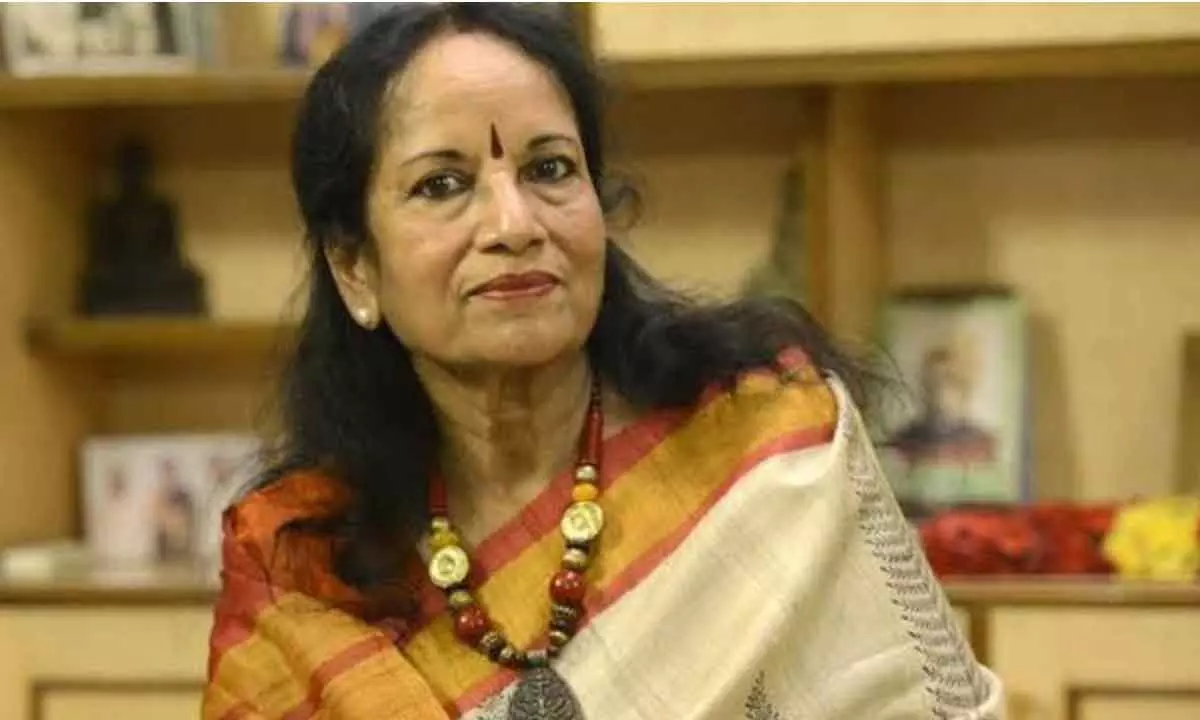Vani Jairam: A legendary singer and an all-India icon

As a trend, it does not really have a precedent in Indian cinema.
As a trend, it does not really have a precedent in Indian cinema. There may be not many examples to quote wherein a song in a film, which had gained phenomenal popularity was highlighted in wall posters as it USP and exhorting the audience to watch the film in which it was featured. Yet there was someone who found the idea worthwhile to take up and attempt it as an advertising strategy.
The film was 'Dheerga Sumangali' released in April 1974 and made in Tamil. The song: 'Malligai En Mannan Mayangum' composed by the ace music director M S Viswanathan and sung by the noted playback singer, Vani Jairam, 77, who had a tragic ending to her renowned existence on February 4.
The above incident was recollected by none other than the iconic singer, who has crooned more than 10,000 songs in 19 Indian languages in a Tamil television programme aired during Dasara 2022. Obviously, it made her feel high up in the clouds, given that she was a relatively new entrant to the Tamil film industry, after a national-level fame attained with her 1971 Hindi film ' Guddi' in which she sang 'Bole Re Papihara' for Jaya Bhaduri, who made her debut in Hindi cinema with that film.
As Indian cinema began attaining a faster traction in the 1960s with more films being made and exhibited, quite often one has heard that in that rarefied world of greats, a few were compelled to stay out, despite possessing the pedigree and talent to be there. It was true of every film industry then, notably in the most active ones functioning out of Bombay and Madras (as both cities were called then).
It was in the 1970s, when the post-Independence generation began looking for newer faces and voices to hook them into movie watching and enjoying the celluloid experience that things began to change. Into this scenario, came in Vani Jayaram, who was accidentally spotted by M S Viswanathan and who gave her many songs, apart from his proteges Shankar-Ganesh, who made her sing many kinds of songs from duets and lovey-dovey numbers to soul-stirring ghazal type of songs.
Competing with the senior trio of P Suseela, S Janaki and L R Eswari who were then already a decade and more old in southern cinema, Jairam, though severely lagging behind in quantity, made up for her niche renditions which made her voice a special preference for music directors till A R Rahman, who began in the 1990s and took over the Indian music scene in the new millennium.
Her kind of songs were a range in which her competitors, so to speak, were not even under consideration as she had an unique advantage of being highly proficient in both musical forms – Carnatic and Hindustani . In fact, it was with a quest to learn the latter form of music, she sought a transfer to Bombay in the late 1960s, when she was employed with State Bank of India, which she quit later.
What was similar between the quartet of female singers in southern films was that all of them were singing in all four southern languages and touched great heights along with their male counterparts like P B Srinivas and S P Balasubrahmanyam, both multi-lingual masters on their own. Statistically speaking, between them the four have sung close to 1.2 lakh songs in these films, a humongous achievement, seen from any angle.
Vani Jairam, the Vellore-born Iyengar, was in a slot of her own among her peers as she was felicitated many times till she lived by the Trusts and Foundations which her fellow music travelers like P Suseela had floated. The range of awards she bagged too were from all over India – including the three National Awards that she got between 1975-1991. In contrast, her seniors managed only slightly better than her, with a longer career phase adding to their advantage. P Suseela has five in her kitty, awarded to her between 1969- 1983 and S Janaki has four presented to her between 1977- 1992. The common feature between these hugely gifted singers being that they bagged these Awards in multiple languages comprising Tamil, Telugu and Malayalam.
Vani Jairam, however, had the privilege of working with the biggest names of Hindi cinema, which her contemporaries did not manage to. In nearly 100 films, she has sung more than 330+ songs which includes her matching vocal cords with the icons like Mohammed Rafi, Kishore Kumar, Mukesh, Mahendra Kapoor and the music scored by Naushad at one end Bappi Lahiri at the other, apart from the irreplaceable R D Burman. A genuinely Indian playback singing talent has abruptly shut down its voice, leaving behind her fans and wellwishers distraught, for sure.

